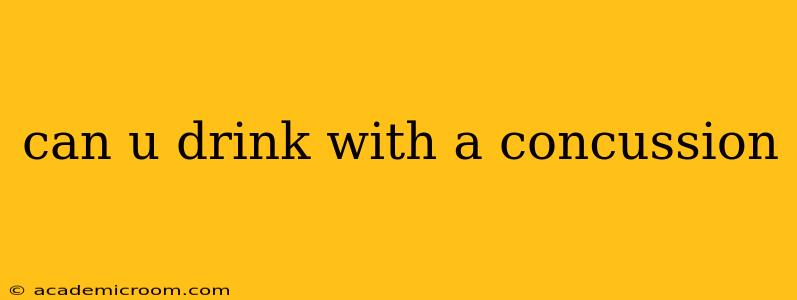Can You Drink Alcohol With a Concussion? A Definitive No.
The short answer is a resounding no. Drinking alcohol after a concussion is strongly discouraged and can significantly worsen your recovery. Alcohol is a depressant, meaning it slows down brain activity. Since a concussion already causes brain dysfunction and inflammation, adding alcohol only exacerbates the problem.
This isn't just a matter of feeling worse; it can have serious, long-term consequences. Let's delve into the reasons why you should absolutely avoid alcohol if you've suffered a concussion.
What Happens to Your Brain After a Concussion?
A concussion is a type of traumatic brain injury (TBI) that results from a bump, blow, or jolt to the head or body that causes the brain to move rapidly back and forth or twist inside the skull. This sudden movement can cause the brain to bounce around or hit against the skull. This can result in chemical changes in the brain that can disrupt its normal function. These chemical changes, coupled with potential swelling and inflammation, are the primary reasons alcohol is so detrimental during recovery.
Why Alcohol Worsens Concussion Symptoms
Alcohol interacts negatively with the brain's healing process in several ways:
- Increased Inflammation: Alcohol can increase inflammation in the brain, further hindering the healing process. This inflammation can prolong symptoms and potentially lead to more serious complications.
- Impaired Cognitive Function: Alcohol impairs cognitive function, such as memory, concentration, and decision-making. These functions are already compromised after a concussion, and alcohol only worsens the deficit.
- Delayed Recovery: Studies have shown that alcohol consumption after a concussion can significantly prolong the recovery time. What might be a relatively short recovery period could be extended unnecessarily.
- Increased Risk of Complications: In severe cases, alcohol consumption following a concussion can increase the risk of complications such as post-concussion syndrome, a condition characterized by persistent symptoms that can last for weeks, months, or even years.
- Interaction with Medications: If you're taking any medications prescribed for your concussion, alcohol can interact negatively with them, potentially reducing their effectiveness or causing dangerous side effects.
How Long Should You Avoid Alcohol After a Concussion?
There's no magic number, as recovery times vary greatly depending on the severity of the concussion and individual factors. However, it's generally recommended to avoid alcohol entirely until you're fully recovered and cleared by a medical professional. This often involves complete symptom resolution and a neurocognitive assessment demonstrating normal function. Rushing back to alcohol consumption can severely hamper your progress and potentially lead to long-term health consequences.
What are the Symptoms of a Concussion?
Recognizing the symptoms of a concussion is crucial for proper management and recovery. These can include:
- Headache
- Dizziness
- Nausea or vomiting
- Blurred vision
- Balance problems
- Sensitivity to light or noise
- Confusion
- Memory problems
- Difficulty concentrating
- Fatigue
- Sleep disturbances
What Should I Do If I Suspect a Concussion?
If you suspect you've sustained a concussion, seek medical attention immediately. A healthcare professional can properly diagnose the injury, assess its severity, and provide guidance on appropriate treatment and recovery strategies. This includes advice on avoiding alcohol and other potentially harmful substances.
In summary, consuming alcohol after a concussion is never a good idea. The potential risks far outweigh any perceived benefits. Prioritize your health and recovery by abstaining from alcohol until you're fully cleared by a medical professional. Your brain's health is paramount, and responsible recovery is key to long-term well-being.
